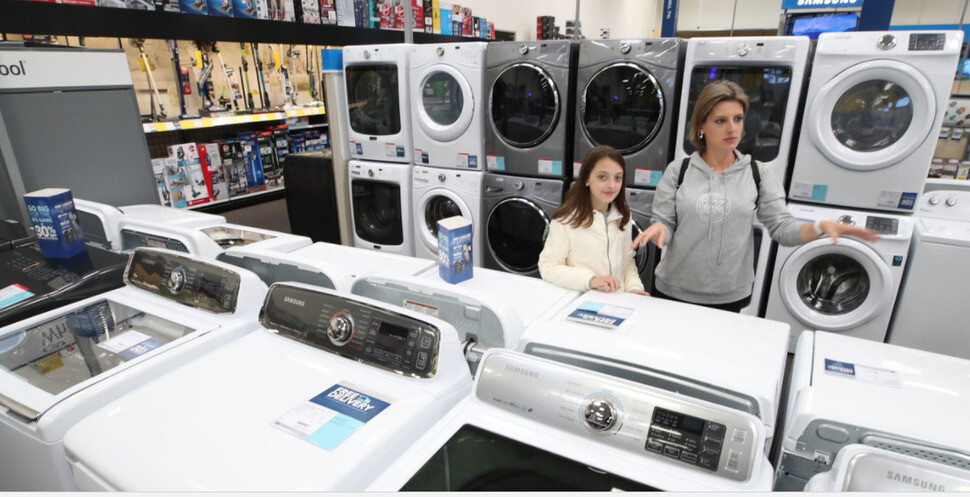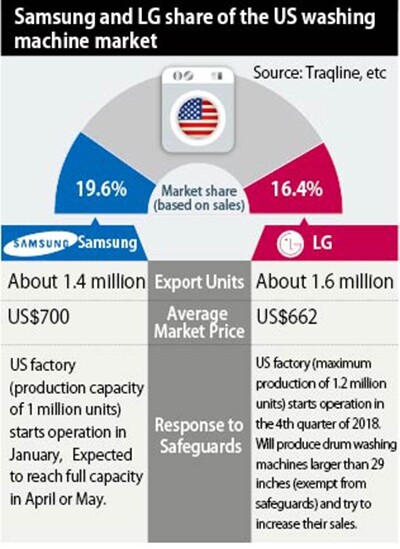hankyoreh
Links to other country sites 다른 나라 사이트 링크
South Korean companies to take major hit from US trade safeguards

South Korean companies such as Samsung, LG and Hanwha that are expected to take a major hit from the US’s activation of safeguard measures have been busy preparing countermeasures even as they register their displeasure to the move. Some of the options on the table are moving production to the US, expanding exports of tariff-free products and diversifying export markets.
In a statement released on Jan. 23 in response to the imposition of tariffs on washing machines, Samsung Electronics said that the US government’s safeguard decision restricted consumer choice and damaged the market. LG Electronics also warned that American customers and the US distribution industry would ultimately be harmed and that regional economies and the home appliance industry would be negatively impacted.

Samsung Electronics and LG Electronics have been exporting 1.6 million and 1.4 million washing machines, respectively, to the US each year. When the safeguard takes effect at the beginning of next month, the first 1.2 million imported washing machines will face a 20% tariff, with a 50% tariff applied to washing machines exceeding that quota. After the tariff, the price of products currently selling for US$700 could rise to US$900-1,000. The two companies currently have the second- and third-largest share in the American market, after Whirlpool.
Samsung Electronics is planning to absorb the shock through local production in the US, but this approach has its limits. The company began operations at its factory in Newberry County, South Carolina, on Jan. 12, but it will probably take four or five months before it reaches full capacity. The factory has a maximum yearly production capacity of 1 million washing machines, but this year it’s unlikely to reach even half that capacity.
The damage will be even greater for LG Electronics, which is supposed to complete construction on its local factory in the fourth quarter of this year. The company is planning to run a sales promotion on tariff-free washing machines, including drum washing machine larger than 29 inches, but that is bigger than most consumers prefer.
Industry sources expect that the two companies will not incorporate the entire amount of the tariff into the prices they offer consumers. To maintain competitive prices, they’re likely to reduce their margin or even sell at a loss. “No doubt, they’re exploring a range of options, but ultimately they’ll have no choice but to expand local production,” said one industry source.
As for solar panels, which will face tariffs as high as 30%, exports to the US are likely to decrease by 10-30%. In 2016, the US imported a total of US$8.3 billion worth of solar cells and modules. US$1.3 billion of this was exported by South Korea, which ranked third, after Malaysia and China.
The South Korean solar industry is expected to suffer a major blow, given the large number of small firms active in the market. “One of the 20 companies exporting solar cells and modules to the US is Hanwha Q Cells, which has operations in 40 countries, but some of those companies are much smaller than that. Since they’re all part of a single production network, the US’s safeguard measure could cause serious damage in the domestic solar industry, including a string of bankruptcies,” said one source in the solar industry. These companies are looking to move into new export markets in Europe, Japan and Australia.
By Choi Ha-yan, staff reporter
Please direct questions or comments to [english@hani.co.kr]

Editorial・opinion
![[Editorial] Penalties for airing allegations against Korea’s first lady endanger free press [Editorial] Penalties for airing allegations against Korea’s first lady endanger free press](https://flexible.img.hani.co.kr/flexible/normal/500/300/imgdb/original/2024/0502/1817146398095106.jpg) [Editorial] Penalties for airing allegations against Korea’s first lady endanger free press
[Editorial] Penalties for airing allegations against Korea’s first lady endanger free press![[Editorial] Yoon must halt procurement of SM-3 interceptor missiles [Editorial] Yoon must halt procurement of SM-3 interceptor missiles](https://flexible.img.hani.co.kr/flexible/normal/500/300/imgdb/child/2024/0501/17145495551605_1717145495195344.jpg) [Editorial] Yoon must halt procurement of SM-3 interceptor missiles
[Editorial] Yoon must halt procurement of SM-3 interceptor missiles- [Guest essay] Maybe Korea’s rapid population decline is an opportunity, not a crisis
- [Column] Can Yoon steer diplomacy with Russia, China back on track?
- [Column] Season 2 of special prosecutor probe may be coming to Korea soon
- [Column] Park Geun-hye déjà vu in Yoon Suk-yeol
- [Editorial] New weight of N. Korea’s nuclear threats makes dialogue all the more urgent
- [Guest essay] The real reason Korea’s new right wants to dub Rhee a founding father
- [Column] ‘Choson’: Is it time we start referring to N. Korea in its own terms?
- [Editorial] Japan’s rewriting of history with Korea has gone too far
Most viewed articles
- 1[Editorial] Penalties for airing allegations against Korea’s first lady endanger free press
- 260% of young Koreans see no need to have kids after marriage
- 3Months and months of overdue wages are pushing migrant workers in Korea into debt
- 4Bills for Itaewon crush inquiry, special counsel probe into Marine’s death pass National Assembly
- 51 in 3 S. Korean security experts support nuclear armament, CSIS finds
- 6[Guest essay] Maybe Korea’s rapid population decline is an opportunity, not a crisis
- 7[Reporter’s notebook] In Min’s world, she’s the artist — and NewJeans is her art
- 8[Editorial] Yoon must halt procurement of SM-3 interceptor missiles
- 9S. Korea discusses participation in defense development with AUKUS alliance
- 10Cracks found in containment building of UAE nuclear power plant built by S. Korean companies